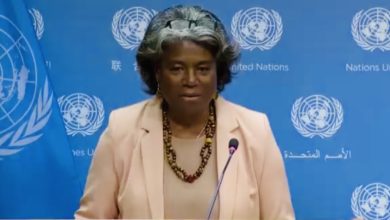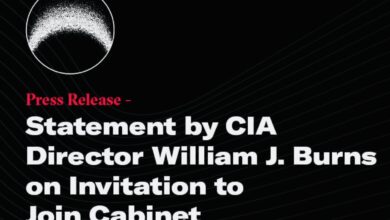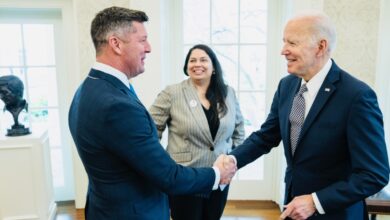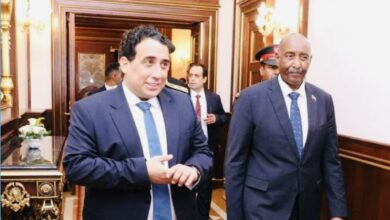Remarks by Ambassador Linda Thomas-Greenfield at a Press Conference on the May Program of Work and the U.S. Presidency of the UN Security Council

Rashad AlKhader -Foreign Press Center
New York From UN
Remarks by Ambassador Linda Thomas-Greenfield at a Press Conference on the May Program of Work and the U.S. Presidency of the UN Security Council
MS. OLIVIA DALTON: Good afternoon, everyone, and welcome to today’s press briefing on the United States’ Security Council presidency. Before we go to your questions, Ambassador Thomas-Greenfield will deliver a few remarks and then take us through the May program of work.
Ambassador.
AMBASSADOR LINDA THOMAS-GREENFIELD: I did say good morning when I walked in. Meant to say good – oops – good afternoon to all of you. It’s great to be here with you in person. I’m recalling very fondly my first event here just days after I arrived as the U.S. Permanent Representative. I was very much a neophyte. You guys were frightening to see across this space for my first time, and I have thankfully got to know many of you, and it really has been wonderful working with you, and I look forward to continuing that.
It really is a privilege to talk to you today about what we have planned at the – as the United States assumes the presidency of the United Nations Security Council. In addition to the start of my presidency, today is also World Press Freedom Day. So, before I dive into the details of the month, I want to take a moment to acknowledge in my national capacity the importance of a free and independent press across the globe.
A free and independent press serves as the cornerstone of every democracy. We rely on the media to seek out the truth, to challenge those in power, and tell the people of the world what we need to know. We count on the media to expose corruption, to counter disinformation, to facilitate the exchange of ideas, to shine a spotlight on human rights abuses, and to hold governments to account. This work is as important as ever today – around the world and here at the United Nations. But too often, journalists are targeted just for doing their jobs. Some get harassed – and I know many of you have had that experience; others are even attacked, detained, or killed.
Today, we pay respects to journalists who lost their lives to deliver the news, to report the truth, and to ensure that all of us can take – can make fact-based decisions that make us safer, stronger, and more secure.
Just last week, Radio Free Europe journalist Vera Gyrych was killed by a Russian missile that struck her building in Kyiv – yet another devastating loss.
This is an important moment to reaffirm our collective commitment to the protection of journalists and to the protection of journalism. And therefore, I can’t think of a more apt way to start our presidency than by engaging in today’s discussion with all of you.
Now, in my capacity as the President of the Security Council, I’ll outline our priorities and plans for the month of May.
We’re proud to be holding two signature events during our presidency. You may recall that in March of 2021, just after I arrived in New York, the United States chaired a Security Council meeting on the link between armed conflict and food security, and once again we will bring a spotlight to conflict as a driver of food insecurity. To address this growing crisis, the United States will convene a Security Council open debate on May 19 to examine the nexus between conflict and food security, and I’ve asked Secretary Blinken to travel to New York to chair this meeting. The Council will consider steps we need to take to make sure increasing food security does not drive new conflicts, instability, particularly in fragile states.
Our second signature event for the month, on May 23, will focus on the role of the use of digital technologies in maintaining international peace and security. This is a new and important focus for the Security Council. It is long past time for us to fully grapple with the impact of digital technologies – that the impact has on maintaining peace and security.
In addition to our signature events, we will of course be seized with Russia’s war in Ukraine, as this Council has been for the past several months. We will have a meeting on Ukraine on May 5 with potentially more to follow as the situation demands.
I also want to emphasize three meetings we will have on Syria this month: the humanitarian situation on the 20th, chemical weapons on the 23rd, and the political situation on the 31st. And I’d like to highlight the annual debate on protection of civilians on the 25th. The debate takes on heightened importance given the attacks on civilians in Ukraine, but also in other conflicts around the world like in Ethiopia and Yemen and Burma.
And throughout the rest of the month, we will continue to hold other important, regularly scheduled meetings in the Council, which you all have seen on our program of work that we adopted in the Council this morning.
In all aspects of the Council’s work this month, our goal is to ensure that the women, peace, and security agenda is fully integrated, including country-specific discussions, and we also intend to include civil society briefers in every meeting we can, and ensure that all briefers are protected from reprisals, full stop. Further, we are committed to promoting gender balance and striving toward gender parity and meaningful diversity among those we invite to brief the Security Council.
I’d now like to make a few additional comments about the month and these meetings and events in my national capacity. On our first signature event, on food security, many of you know this issue is personal for me. I’ve seen starvation up close with my own eyes. That famine and acute malnutrition are largely caused by war, sometimes intentionally, is really unacceptable. This is even more urgent today because of Russia’s unconscionable invasion of Ukraine.
Ukraine, as you all know, used to be a breadbasket for the developing world, but since Russia has spurned the largest refugee crisis in Europe since World War II, blocked crucial ports and destroyed civilian infrastructure and grain silos, desperate hunger situations in Africa and the Middle East are getting even more dire.
This meeting of the Security Council will fall during a week of action that the United States will be launching to address food insecurity across the globe. As part of that, on May 18, on the eve of this crucial Security Council meeting, Secretary Blinken will chair a global food security call to action ministerial here in New York. This meeting will take place at the UN and will include foreign ministers from many regionally diverse countries to review urgent humanitarian needs and take steps to build future resilience.
Important work is already underway on this topic in other international fora, including the G7. Our intent is to expand the circle, including both donors and countries most affected by the spike in food insecurity. The UN is the right venue for such a meeting, especially given the role of UN agencies in meeting humanitarian needs and implementation of solutions. We cannot look away from the millions who are worried about where they’ll find their next meal or how they’ll feed their families.
With respect to our second signature event, I want to add that peace and security has been completely transformed by digital technology, for better or for worse. We know how these tools can be abused to spread disinformation, restrict access to information, and deny human rights, but we also see opportunities to use digital technologies to do tremendous good. Digital tools can help to identify emerging threats. They can protect civilians and civilian infrastructure and reconnect and reunite displaced peoples with their families. They have prosecutors collect evidence to build cases for war crimes, and they connect refugees to host families and employment opportunities, and they help us better prepare peacekeepers to deploy in the field and improve our ability to engage different stakeholders in peace talks.
As the world pursues a digital future that is open, secure, interoperable, accessible, and reliable, we have to be mindful of both the benefits and the risks of digital technologies. Our signature event on digital technology and international peace and security will contribute to the Council’s understanding of the evolving landscape, and it will offer a chance to share national perspectives as well as best practices, highlight the importance of capacity-building, and help us all identify ways the UN can continue to adapt its efforts.
I also want to add a word on Syria. The dire humanitarian situation facing millions of Syrians remains another significant priority for the United States. And in addition to the three meetings we will hold in the Security Council this month, I want to share that in the coming weeks, I intend to travel to the region once again for an update on the lifesaving aid flowing through the cross-border mechanism that was reauthorized unanimously by the Security Council last July. Of course, our focus on Syria in May takes on renewed importance as we approach July 10, when the Security Council must renew and expand the mandate that allows vital food, clean water, vaccines, and medicines to continue flowing into Syria.
Finally, I want to note that on May 17, we will be hosting a memorial for Secretary Madeleine Albright in the United Nations General Assembly. I look forward to the opportunity to celebrate one of my heroes, and I also am looking forward to hearing others’ tributes to her fierce intelligence, her unending compassion, and her trailblazing accomplishments. I’d like to dedicate all of our efforts this month in her honor.
Thank you, and with that, I’m looking forward to your questions. Olivia.
MS. DALTON: Thank you, Ambassador. Edie, would you like to kick us off?
QUESTION: Madam Ambassador, on behalf of the United Nations Correspondents Association, thank you very much for doing this briefing. A couple of quick follow-ups and then a question.
Will the Secretary-General be briefing on Ukraine on the 5th? And are you expecting any outcome documents from your two signature events? And then I have a question. (Laughter.) That’s just – well, my question – my question is: Given the criticism that the United Nations, especially the Security Council, has come under internationally for not being able to do anything significant to stop the war in Ukraine, I wonder if there is anything else that the United States is planning, perhaps in the GA or elsewhere, to try and bring this war to an end?
AMBASSADOR THOMAS-GREENFIELD: Thank you, Edie, for all three of your questions. (Laughter.) We have invited the SG to speak on the 5th, and he has accepted to speak.
In terms of outcomes from our signature events in the Security Council, we’re not planning for any outcome documents to come out of those events.
And in response to your question about the criticism of the Security Council not being able to stop the war and if there’s anything else we are planning, I think while it has been a challenge, the Security Council has been extraordinarily successful. We have been successful in isolating Russia in the Security Council, and that’s a significant success. We have been successful in unifying the voices condemning Russia in the General Assembly, but it came about because there was so much support for it in the Security Council. And getting 141 votes to support that effort was a significant success for all of us.
We were successful in the General Assembly in bringing a resolution forward and providing support for Ukraine for humanitarian assistance. And we have been successful in unifying the UN in suspending Russia from the Human Rights Council. Russia is isolated in the Security Council, and every time we have a discussion in the Security Council as it relates to Russia, they are on the defensive and we will continue to keep them on the defensive until they end their brutal attack on the Ukrainian people.
MS. DALTON: Pam.
QUESTION: Thank you, Olivia, and thank you, Ambassador. It’s Pamela Falk from CBS News. We’re looking forward to the month. My question is about the evacuation of Mariupol and the steel factory. The Secretary-General brought this up and – with Vladimir Putin and somehow the UN and the ICRC have assisted, but only a portion of those who got out before the Russians began bombing again. So, what is your view of how to keep that momentum going, and is there any sense that that can be negotiated? Thanks.
AMBASSADOR THOMAS-GREENFIELD: Look, thanks for the question, Pamela. And let me just say that we appreciate and are grateful for the Secretary-General and the Red Cross effort to facilitate the evacuations of civilians from Mariupol. We say to the Russians that they have to do the right thing – they have to continue to guarantee safe passage for any civilians who wish to leave and not impede it in any way, and they must also allow deliveries of humanitarian assistance, particularly food and medicines, to those who are left behind, as well as safe passage for volunteers who have gone in to help those individuals.
We will continue to press the Russians on this. We will continue to support the efforts of the Secretary-General to use his goof offices to press – to pressure the Russians on this. And we will continue to support efforts of other humanitarian organizations who are working under very extraordinarily difficult and sometimes dangerous circumstances to provide support to the people in need in Mariupol and in other locations inside of Ukraine.
QUESTION: Thank you.
MS. DALTON: James.
QUESTION: James Bays, Al Jazeera. Can I ask you how the situation in Ukraine is affecting the Council’s work overall? Has it altered the tone? Is it business as usual? Are you engaging socially with your Russian counterparts? And is it polluting diplomacy on other issues?
AMBASSADOR THOMAS-GREENFIELD: That sounds like three questions, James. (Laughter.) In terms of how the Council is functioning, we are still functioning. We had a successful meeting this morning, which approved our program of work for the month, and we continue to discuss other issues in the Council that we have to take action on over the course of our presidency but also depending on whoever is president.
I will say that the tone within the Council has become somewhat muted. I won’t say that there are any – there are no fireworks that are going on that are different from the fireworks that we always have. We are as strong on our views, whether it’s Ukraine or other parts of the world, and other Councilmembers are equally strong. But I have noticed that we’re somewhat muted, particularly when we are outside the Council.
I think on the social side, all – there is a sense of discomfort, and I think, fortunately, in the past few months there have not been any large social engagements that we’ve been required to participate in and where we have to be diplomatic and smile. But I do look forward to continuing to try to move the Council forward during my month as President to deal with the issues of peace and security across the globe and make some positive impact.
MS. DALTON: Michelle.
QUESTION: Thank you. Thanks, Ambassador. Michelle Nichols from Reuters. I wanted to change topics slightly to reproductive health and rights. The previous U.S. administration repeatedly pushed back here at the UN against long-agreed international language on sexual reproductive health and rights. What impact has this had on the international landscape for women and reproductive health and rights, and what can the Biden Administration do here about that? What are you planning to do in the days and weeks going forward?
AMBASSADOR THOMAS-GREENFIELD: Thank you for that question. When we came back in January of 2020, we restored U.S. standing on this issue. We brought back U.S. policy to align with our allies, with the United Nations, and with global norms and to ensure that we were supporting efforts on women’s health and reproductive rights globally. We restored our funding to the UNFPA. We have supported across the board issues related to women.
President Biden put out a strong statement – I think it was today – in terms of the U.S. plan for how we will deal with these issues moving forward, and he was very clear that we will move forward, not backward, as it relates to women’s reproductive rights. So we will continue to press these issues moving forward and ensure that our positions as the U.S. Government support the global positions on these issues.
QUESTION: Just a really quick follow-up. Have you noticed any lingering hangover here at the UN from the stance of the previous U.S. administration?
AMBASSADOR THOMAS-GREENFIELD: No. What I’ve noticed is that people were happy we came back and that we realigned ourselves and that we resumed funding UNFPA. That was a major, major commitment that the President made early on, and he honored that commitment immediately.
QUESTION: Thank you.
MS. DALTON: Okay. Ibtisam?
QUESTION: Thank you, Olivia. Thank you, Ambassador, for the briefing. My name is Ibtisam Azem from Al-Araby Al-Jadeed newspaper. I have a question on the issue of human rights that the Biden administration put high on its priority, and my question is about specifically Middle East countries, your allies in the Middle East. And I want to ask specifically about Egypt and human rights violations there. I asked you in last September before the GA about the case of Alaa Abd-El Fattah. And as you know, the administration gave more than $1 billion in military aid to Egypt. You hold back about $130 million lately, but you still sell weapons for billions of dollars to the Egyptian Government. And the question is two parts.
The first part about Alaa Abd-El Fattah. Again, he, as you probably know, activist who was a leading figure in 2011 Arab Spring uprising. A month ago, he started a hunger strike protesting his situation and treatment, and it’s said that he has been tortured and is in a maximum security prison in Egypt. My question is whether you are following his case, and any message to his family? And what your administration is doing to hold the Egyptian government accountable on their human rights violations? Thank you.
AMBASSADOR THOMAS-GREENFIELD: Well, let me start by saying that the administration has been very strong on bringing back human rights as a core part of our foreign policy and a core priority for us in our relationships with every country we work with. We are following his situation in Egypt, and I can tell you that we do engage with the Egyptian government on issues of human rights; we engage with them on this issue whenever we meet with them and at every level that we meet with the Egyptian government. So, you can be assured that it is always on our agenda when we have discussions with the government.
QUESTION: If I may follow up just quickly. But which practical step are you taking to follow up on that? Because it seems to be despite your – the way you talk about it and the critiques you are doing, it doesn’t have an effect on facts on the ground. There are still thousands of Egyptians who are in prison for political reasons, including Alaa. He’s not – he’s one of many others.
AMBASSADOR THOMAS-GREENFIELD: Yeah, I – and again, what I can say is you can be assured that this is something that is a high priority for the U.S. government when we engage with the Egyptian government, and again, at every single level. And this is a huge change from previously where we didn’t raise human rights issues, we didn’t see it as a major priority. And it’s something that is a major priority, and it is – we’re not always successful immediately in our engagements, and that’s in many different places in the world. But every country knows that if there are issues of human rights that they can expect that this will be at the top of our priority list when we’re engaging with those countries and when we’re having discussions with them about where we go next in our bilateral relationship.
MS. DALTON: Let’s go to the back. Philippe, I saw your hand.
QUESTION: Thank you very much, Ambassador. Philippe Rater, AFP. Do you plan – in May do you plan any vote on your draft resolution on North Korea?
AMBASSADOR THOMAS-GREENFIELD: Thank you, Philippe. And we do have a resolution that is being discussed in the Council on DPRK, and it is our plan to move forward with that resolution during this month. We’re very concerned about the situation there, the numerous violations of Security Council resolutions that the DPRK has engaged in, and it is our hope that we can keep the Council unified in condemning those actions by the DPRK.
MS. DALTON: Benno.
QUESTION: Thank you, Ambassador. Benno Schwinghammer with the German Press Agency, DPA. Just a quick follow-up to Michelle’s question and about the Supreme Court, who’s poised to overturn Roe v. Wade. Do you see this as something that could weaken your stance as the U.S. Representative to push for health rights for girls and women abroad, for example in Afghanistan?
AMBASSADOR THOMAS-GREENFIELD: Well, the Supreme Court hasn’t spoken yet, and while we’ve seen this document that has been leaked and it raises a number of concerns for all of us in our international policies for – in terms of support for women and girls’ reproductive health, we will continue to support those efforts.
MS. DALTON: Down in front.
QUESTION: Thank you, Madam President. My name is Abdelhamid Siyam from the Arabic daily Al-Quds Al-Araby that is based in London. Madam President, I don’t think there is good occupation and bad occupation.
AMBASSADOR THOMAS-GREENFIELD: I’m sorry, I missed that.
QUESTION: There is no good occupation and bad occupation. So, when the people of Ukraine resist their occupiers, they are heroes. When Russia bombed these buildings and those hospitals and train stations, these are war crimes. Taking the view away from Ukraine to Palestinian occupied territories, same thing is done to the Palestinians. But when they resist their occupiers they are called terrorists, and when these buildings are destroyed in Gaza, that’s self-defense. So, there is double standard that the world can see. What can be done to unify the speech of the United States and its policies to stand against occupation, against confiscation of land, against 6,000 Palestinians in jail, against putting children in jail and putting on a military (inaudible), and speaking just – not only just stating that you support the two-state solution but putting some pressure – because you give Israel $4 billion a year – so that it can redress some of these atrocities committed against the Palestinian people for over 55 years? Thank you very much.
AMBASSADOR THOMAS-GREENFIELD: Good. Thank you for that question. And we have been clear throughout that we believe the Palestinians and Israelis equally – equally – deserve equal measures of freedom, security, prosperity, and dignity. And we’ve made our views clear both in private and in public that neither side should take any unilateral steps that exacerbate tensions and undercut efforts to advance a negotiated two-state solution. But we know the two sides are far apart and the ground, unfortunately, is not ripe for moving or restarting negotiations that will lead to that two-state solution.
As you know, I traveled to the region in November. I spent significant time meeting with the Israelis, but I also spent a significant amount of time meeting with the Palestinians and discussing with them the way forward. And we’re still working on that, and I don’t see that we have a policy that is in any way different from what we’re doing elsewhere in the world, but we do – we’ve made clear our strong stance in support of Israel’s security as they are being attacked by – and it is out of Hamas, and I don’t think there’s any disagreement among many that they have made terrorist attacks, and we have to be strong in our support and in our efforts to defend the rights of the Israelis to defend themselves against rocket attacks from Hamas and other terrorist groups. But we also are clear that Palestinians deserve peace and prosperity.
MS. DALTON: Celhia, go ahead. You had your hand up.
QUESTION: Thank you, Madam Ambassador. I’m Celhia de Lavarene and I work for Africa (inaudible). Let me go back to Ukraine. You must have seen or felt that a lot of Africans were not going to be in your favor – I mean not your favor but in favor of the resolution for Ukraine because they were saying that, what about them? They are going to suffer the most, and we can see that it’s true. So, what do you say to some of them who say that some country put pressure on them to vote in favor of your resolution?
AMBASSADOR THOMAS-GREENFIELD: One country put pressure on them, in writing, to vote against the resolution. The U.S. never put pressure. We appealed to countries because what we are dealing with here is an attack on the sovereignty of a nation. We’re dealing with an attack on the core values of the UN Charter and the integrity of Ukraine’s border. So, the pressure that countries felt, that pressure was not to support doing the right thing, and that is supporting Ukraine.
We have had – I personally had a number of very intense and personal discussions with my African colleagues to say to them this is not a war between the United States and Russia, and to make clear that yes, this is going to have an impact on Africa, and it’s because of that impact on Africa that it is important that Africans, African countries, stay on the right side of condemning Russia for the actions that they have taken in Ukraine.
The vote was divided on the African continent, but a number of countries did support the resolution.
MS. DALTON: Maggie?
QUESTION: Hi, Ambassador. Margaret Besheer with Voice of America. Ambassador, you said Syria is going to be a priority for you this month and you’re going to the region. I’m wondering what the U.S. position is on the warming of relations a bit from Arab countries, some Arab countries, towards Syria at the present time, including from the UAE, which is on the Council with you. They’re sort of bringing Assad back into the fold a little bit. Is that helpful? Is that anything that will get you to a lasting solution on the – on resolving the war or even help you with the cross-border aid resolution that’s coming up?
AMBASSADOR THOMAS-GREENFIELD: We think the Assad regime has not earned the right for a softening of relationships. They are still holding their people hostage and they continue to commit human rights violations against their people, and that’s why we think it is absolutely important that we do everything in our power to keep the cross-border humanitarian assistance flowing into Syria. We have worked, as you know, last year and came to an agreement with the Russians that enabled that crucial humanitarian assistance to continue to flow. Russia requested that the Secretary-General issue a report on cross-line aid this past December, and the United States supported that. We supported the provision of aid through all modalities, including cross-border as well as cross-line, and we were happy that the Secretary-General’s report reflected both processes.
But it’s clear to us that cross-line aid is not enough. We cannot provide the assistance that the Syrian people need just through cross-line, and that is one of the reasons that I will be working over the course of my presidency and up through July to get the mandate expanded and hopefully continued. So this will be work that all of us will be working on in the Security Council, all 15 members. I think we have agreement that humanitarian assistance in Syria is still needed. And even for those countries who might be thinking about a softening of their approach to Syria, I think they will also understand that the continuation of humanitarian assistance cross-line as well as cross-border will be essential to maintaining support for the Syrian people.
MS. DALTON: We have time for one more, and we’ll go to Joe.
QUESTION: Thank you. Joseph Klein, Canada Free Press. First of all, can you give us any update on the JCPOA negotiations and whether this subject has come up in your discussion with your colleagues in the Security Council?
And with respect to the briefing on the 23rd on technology and security, you mentioned disinformation, and I’m wondering whether you see any relationship in the discussion in the Security Council with the recently announced Disinformation Governance Board looking for best practices – you mentioned best practices being discussed at this meeting on the 23rd – and whether you see, I guess in your national capacity, any role for government regulation of social media platforms that are not doing the job of controlling what might be regarded as hate speech or disinformation. Thank you.
AMBASSADOR THOMAS-GREENFIELD: On the JCPOA, I can say that we have made some substantial progress in resolving a significant number of the issues that we think would be necessary for us to come back into the deal on a compliance-for-compliance basis, but there’s still a lot more work to be done, and we don’t have an agreement just yet, and it’s possible we might not get there. Of course, if diplomacy does not succeed, then we’ll continue to work very closely with others in the international community to increase the pressure on Iran. The President made a solemn commitment that Iran must not be allowed to acquire a nuclear weapon, but he also made a commitment that he was prepared to go back into the JCPOA. So, we’re continuing to work on that effort, and we’ll see where it leads.
In terms of our event on the 23rd, we will look at this issue broadly as it relates to disinformation. And I do – I mean, there’s no doubt that it’s related to what the United Nations is doing because the UN – the setting up of this governing board and even the Secretary-General’s plan to appoint a technology ASG. These are all part of the same initiative, and we hope to work with them because our goal is that in cyberspace, we come up with an agreed-upon set of values and regulations that will provide the opportunity for digital technology to be used for good and not be used for bad.
As it relates to government regulations, that’s a two-edged sword because some governments regulate for good and other governments regulate so that they can control what their people do, what their people say, how they move. So, we want a set of governing regulations that will not allow governments to abuse the human rights of their people but allow digital technology to be used to support people’s needs broadly.
Thank you.
QUESTION: Can I have a follow-up?
MS. DALTON: Thank you. Thank you, Ambassador. Thank you. This is all we have time for today, but we look forward to engaging with you throughout the month of May and doing this again soon.
AMBASSADOR THOMAS-GREENFIELD: Yeah, thank you all very, very much.





